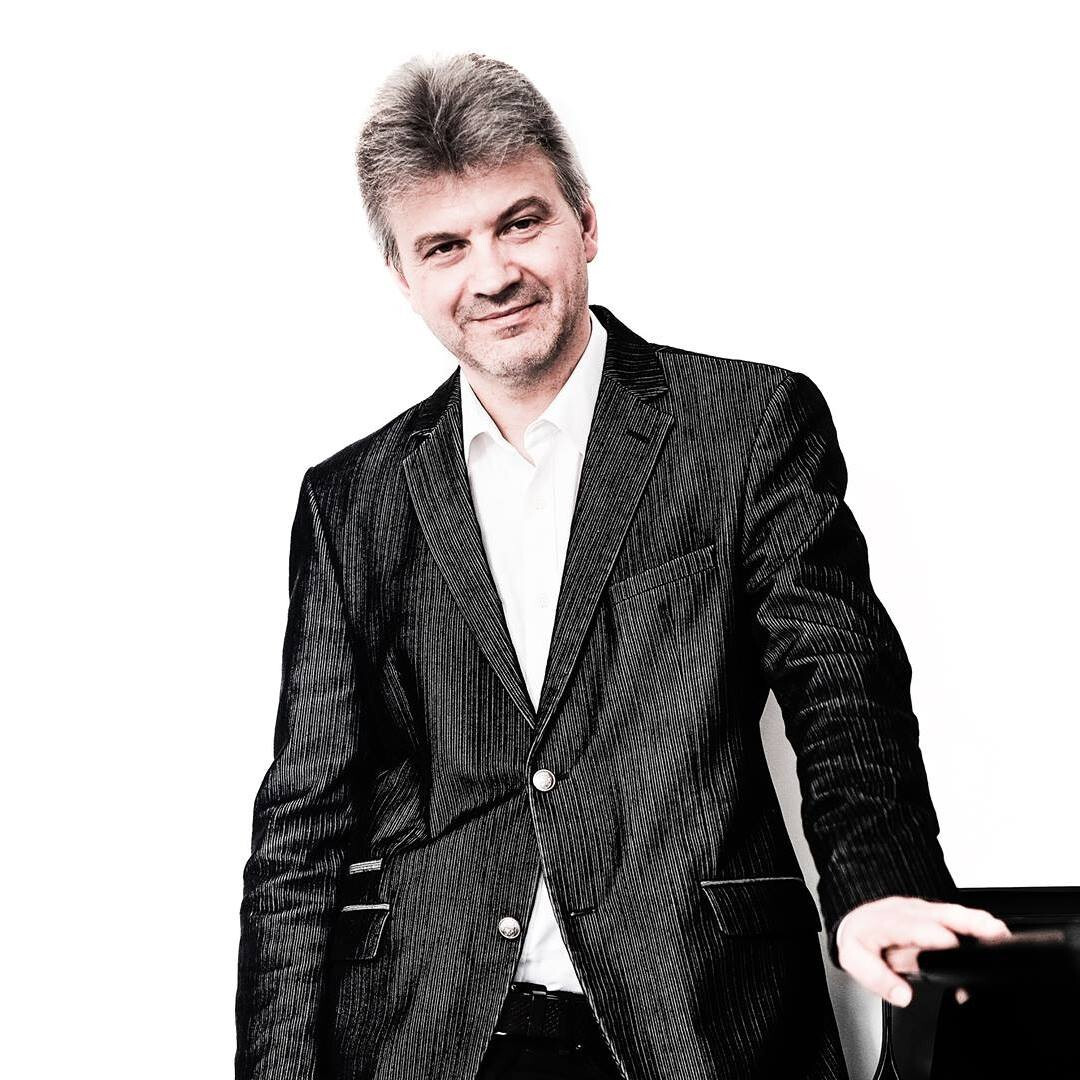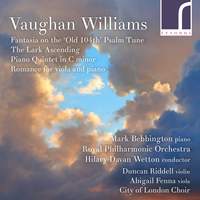Interview,
Mark Bebbington on Vaughan Williams's 'Fantasia on the Old 104th'
 Despite the welcome attention paid to Vaughan Williams in his anniversary year of 2022, to many people he remains largely a symphonist - with the Lark Ascending and Tallis Fantasia perhaps acting as stepping-stones to those nine magnificent orchestral masterpieces. Of course there is far more to Vaughan Williams than this - a range of beautiful solo songs, a small but significant body of chamber works, and plenty of choral pieces of various sizes - and this side of his music, too, is rightly enjoying an increasing share of the spotlight.
Despite the welcome attention paid to Vaughan Williams in his anniversary year of 2022, to many people he remains largely a symphonist - with the Lark Ascending and Tallis Fantasia perhaps acting as stepping-stones to those nine magnificent orchestral masterpieces. Of course there is far more to Vaughan Williams than this - a range of beautiful solo songs, a small but significant body of chamber works, and plenty of choral pieces of various sizes - and this side of his music, too, is rightly enjoying an increasing share of the spotlight.
Still, even those VW aficionados who are familiar with his Phantasy Quintet, string quartets, Mass setting and anthems might be forgiven for a little bewilderment when confronting his Fantasia on the Old 104th Psalm Tune. This curious hybrid work forms the centrepiece of pianist Mark Bebbington's latest album, with the Royal Philharmonic Orchestra, City of London Choir and Hilary Davan Wetton, and that cast-list offers a clue to its nature - it is, for want of a better description, a choral piano concerto.
I spoke to Mark about this unorthodox piece, and the other less-heard Vaughan Williams works also on the album.
The early quintet recorded here was withdrawn by Vaughan Williams and only released after his death by his widow. Do we know why he did not want this piece to enter circulation?
Not really, but Vaughan Williams was extraordinarily self-critical as a young composer and one can well imagine the level of scrutiny he brought to bear on this work! There’s a marvellous ‘searching‘ quality to this music, almost on the cusp of a new musical language, and perhaps that caused him doubt... With the benefit of hindsight, we can only rejoice in Ursula’s (VW’s second wife) wisdom in releasing the manuscript for publication; it’s a masterpiece of late romanticism with all the glorious excess of youth...
More generally, why is there so little chamber music by Vaughan Williams?
It’s difficult to say, because what there is, is wonderful! It strikes me that words and voice were often keystones for the spark of inspiration in his output. So, ‘On Wenlock Edge’ is to me a particularly powerful and atmospheric work, combining as it does, voice, string quartet and inspirational words (Housman). Although he wrote beautifully for other chamber mediums, I think he had to overcome an innate inner resistance to writing ‘just’ for string quartet, for example...
The Fantasia on the Old 104th Psalm Tune is very rarely performed; what’s the story of how this work came into being?
We can’t be sure, but it was a Three Choirs Gloucester commission for 1950 and that, naturally, accounts for the choir.
Although he never openly acknowledged Beethoven’s ‘Choral Fantasy’ as a background influence, that is the only previous work to use the same forces. But Vaughan Williams’s use of those same forces couldn’t be working towards a more different musical and philosophical vision!
The piano part was written for and the work dedicated to Michael Mullinar who was official accompanist for the Three Choirs chorus and became a close friend of the composer. In all probability he wanted to reward Michael for his years of dedicated service; there is a fascinating letter from VW to Emmie Tillett (doyenne of Concert Agents) prior to the premiere in which the composer expresses some concern that Michael's role as a solo pianist in the 'Old 104' may damage his career as an accompanist. Mrs Tillett replies that it would only enhance his career!
It seems to have had only a partially successful premiere; is that the main reason it has been so rarely performed since?
Well, the review in The Times made considerable mention of the difficulties of balance within Gloucester Cathedral - hardly surprising, given the challenges of synchronisation facing the conductor (Vaughan Williams himself). There was little overt comment on the piece itself, however, save a reference to the unusual structure of the work.
The work is an extraordinary world of contradiction and musical ambiguity - indeed that really sums up the 'Old 104th' Fantasia, and I think it's a very difficult work to 'get' on first (or indeed second or third) hearing. The spiritual affirmation of the text and the writing for the choir is entirely conventional throughout; it is the three extraordinary solo piano cadenza interpolations that are at the heart of the piece. And these are entirely at odds with any notion of convention. Vaughan Williams sets in motion a chain of variations on the chorale hymn tune in which the piano writing is often angry, bitter and explosive, making use of a Lisztian piano tradition to fashion writing that is entirely original and progressive; at one stage during the final cadenza, Vaughan Williams creates a spectral sound world at the extremes of the keyboard, very similar to Beethoven in his final piano sonatas.
So, I think it's the ambivalence of the piece that is 'difficult' and that Three Choirs audience in 1950 may well have been hoping for something more affirmative, something more spiritually reassuring following the uncertainties of the still recent war years. And, as we know, once a work gets off to a slightly faltering start, neglect can often follow...
The unusual juxtaposition of a piano concerto with a triumphant rendition of a hymn begs the fundamental question: what is this piece, at its heart? What sort of place do you think Vaughan Williams imagined it taking in the repertoire?
This is very difficult to answer! I suppose the unusual nature of the musical forces inevitably works against us hearing it very often and Vaughan Williams was always a practical, not to say pragmatic, composer when it came to such matters - so he must have known this. I think, then, that he would have considered it a connoisseur's work...
What fascinates me about the work is how seventy years after its first performance, its message of ambivalence and contradiction, but ultimately of hope and aspiration, speaks to our own troubled times. It is a remarkably fitting anthem for today.
Mark Bebbington (piano), Royal Philharmonic Orchestra, Hilary Davan Wetton
Available Formats: CD, MP3, FLAC, Hi-Res FLAC, Hi-Res+ FLAC



